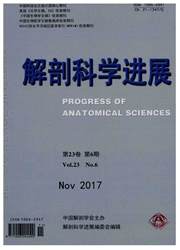

 中文摘要:
中文摘要:
目的分析血管内皮生长因子(VEGF)在运动诱导的神经发生中可能的信号转导途径。方法通过预先埋管方式,向动物侧脑室内分别注射Flk-1、ERK和PI3-K的对应抑制剂SU5416、PD98059和Wortmannin,采用免疫组织荧光染色技术检测海马齿状回内新生细胞数量。结果Wortmannin和SU5416的使用可导致大鼠海马齿状回内新生细胞和新生神经元数量明显减少(P〈0.05),PD98059的使用则没有导致大鼠海马齿状回内新生细胞和新生神经元数量明显减少(P〉0.05)。结论VEGF可能通过受体Flk-1主要激活PI3-K所在的信号通路诱导海马的神经发生。
 英文摘要:
英文摘要:
Objective To investigate the effect of the possible signal transduction pathway of vascular endothelial growth factor (VEGF) on hippocampal neurogenesis caused by exercise in SD rats. Method The administration of Flk-1 inhibitor (SU5416), ERK inhibitor (PD98059) and PI3-K inhibitor(Wortmannin) into lateral cerebroventricular was performed by implanting eannula. Immunofluoreseence staining was used to evaluate the level of neurogenesis. Results The administration of wortmannin and SU5416 lead to the decrease of the number of the newborn cells significantly (P〈0.05); but the administration of PD98059 did not result in the obvious change of the number of newborn cells significantly (P〉0.05). Conclusions The Flk-1 receptor of VEGF mediates the effect of enhancing hippoeampal neurogenesis induced by exercise through activating PI3-K in rats.
 同期刊论文项目
同期刊论文项目
 同项目期刊论文
同项目期刊论文
 期刊信息
期刊信息
